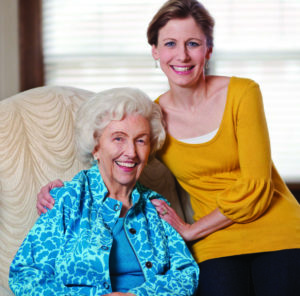Aging Right @ Home is a monthly blog series, answering your questions on providing care for individuals with disabilities, loved ones with dementia and older adults aging in place. If you have a question, please submit to [email protected].
As a Certified Senior Advisor and Certified Dementia Practitioner, I get asked a lot of questions from those seeking advice or care for their aging loved ones, especially those with dementia or other disabilities.
As the owner of one of the largest and longest operating in-home senior care service providers in the area, I witness first-hand the needs many of these families have in providing care.
November is National Family Caregivers Month and being a family caregiver is a labor of love and it can be extremely rewarding. While rewarding, I’ve heard from many that at times the role can also feel like an obligation that is emotionally draining. In addition to the physical and emotional challenges you face, being a family caregiver may create financial strain as well — as many caregivers tend to reduce their hours or take extended (or indefinite) leaves.
Based on these struggles, here are some tips on how to be a better resource for your family caregiver. And, as always, to submit a question, you can reach me at [email protected].
How Can I Help a Family Caregiver Reduce Stress?
Listen for cues of depression and small cries for help: Family caregivers spend many hours helping the person in need. This can create a sense of self-isolation, loneliness or even depression. They often focus on the needs of others so much that they turn off their own feelings. A close family friend’s father was diagnosed with cancer and while her mother was the primary caregiver, she became distant and controlling.
Many years later, and after a full and successful recovery by her father, her mother was able to acknowledge she acted this way because of the feeling of isolation. Loved ones always asked how her husband was doing with treatment, but they never asked how she was coping with being his primary caregiver, or how she felt about the possibility of losing her husband. She had difficulty expressing these anxieties to others and over time she felt a sense of resentment, which in turn created feelings of guilt and self-doubt.
This situation could occur to anyone of us and while we never second guess the need to care for a loved one, each of us still has the need to express our emotions and feel supported. So, the next time you ask how the patient is doing, also ask how the family caregiver is doing. Realize they are both struggling to maintain a sense of normalcy, and both should be supported.
Show gratitude and ask about the caregivers needs and emotions: It is easy to use the primary family caregiver as a gateway into the patient’s life. This subconscious boundary may occur because you don’t want to intrude or you’re just not sure where you fit in to the overall care team.
That’s okay. However, make sure the conversations are not just about the patient. Ask questions about the family caregiver.
When was the last time you went for a walk? Are you able to maintain your regular work schedule? How are you emotionally handling the situation These questions will offer valuable insight into the well-being of the family caregiver and help them think of themselves for a change, even if it’s only for a few minutes.
This slight shift in emotional focus can be a welcomed reprieve for family caregivers who take on the difficult job of caring for a loved one.
Help them by find additional help: Being a family caregiver can feel like an obligation, like they are the only ones that can do it, or that nobody else gets what they do. While that may be true, there are a lot of resources available or a wide variety of needs. Government agencies offer grants for training, certifications or supplemental care.
Also, many charitable groups provide financial aid, meal delivery or donations for specific items that the patient needs. Some businesses and employers may include free services through Employee Assistance Programs that can help reduce the stress felt from navigating the health care system. It is important to recognize that there are professionals that can help, and getting connected to the right agency and right person is extremely important.
Where Can I go to Find Help For a Family Caregiver?
Northern Virginia has a very healthy, active and supportive senior health care system. The Positive Aging Sourcebook is a free guide to retirement living in DC, Maryland, and Virginia. This guide includes everything from Home Care Agencies, Skilled Nursing Agencies, Retirement Communities, Nursing Homes and even Aging Life Care Professionals (formerly Geriatric Care Managers).
This guide also offers helpful articles about how to choose the right service, the right agency and the right team to support your loved one. Aging Life Care Professionals can help with short term emergency’s or long-term planning processes while support groups are a great way to meet others that are experiencing the same challenges you are facing; both are great options to find trusted resources for support.
Also, don’t hesitate to ask your neighbors, check in with trusted members of your church, or search online. For any nursing services billed through Medicare, the Centers for Medicare and Medicaid Services posts annual surveys of providers so make sure you choose one with a five-star rating! For any private pay service, online reviews provide excellent feedback from real clients and patients!
In closing, I’d like to leave you with some wise words from Rosalyn Carter, the former first lady and primary caregiver to former President Jimmy Carter: “There are only four kinds of people in the world. Those who have been caregivers. Those who are currently caregivers. Those who will be caregivers. And those who will need a caregiver.”
So, thank you to all of you who have been, will be or are currently caregivers. And for those of you who need a caregiver, be grateful and appreciative that you have someone so wonderful in your life.
Each month readers can submit questions to Phillip Turner (CSA, CDP), the Owner and Executive Director of Right At Home Northern Virginia, one of the area’s largest and longest-serving providers of in-home senior care.
As a Certified Senior Advisor (CSA) and a Certified Dementia Practitioner (CDP), Phillip is passionate about providing individualized care, enthusiastic management services and collaborating with other health care providers. If you have a question, please submit to [email protected].




